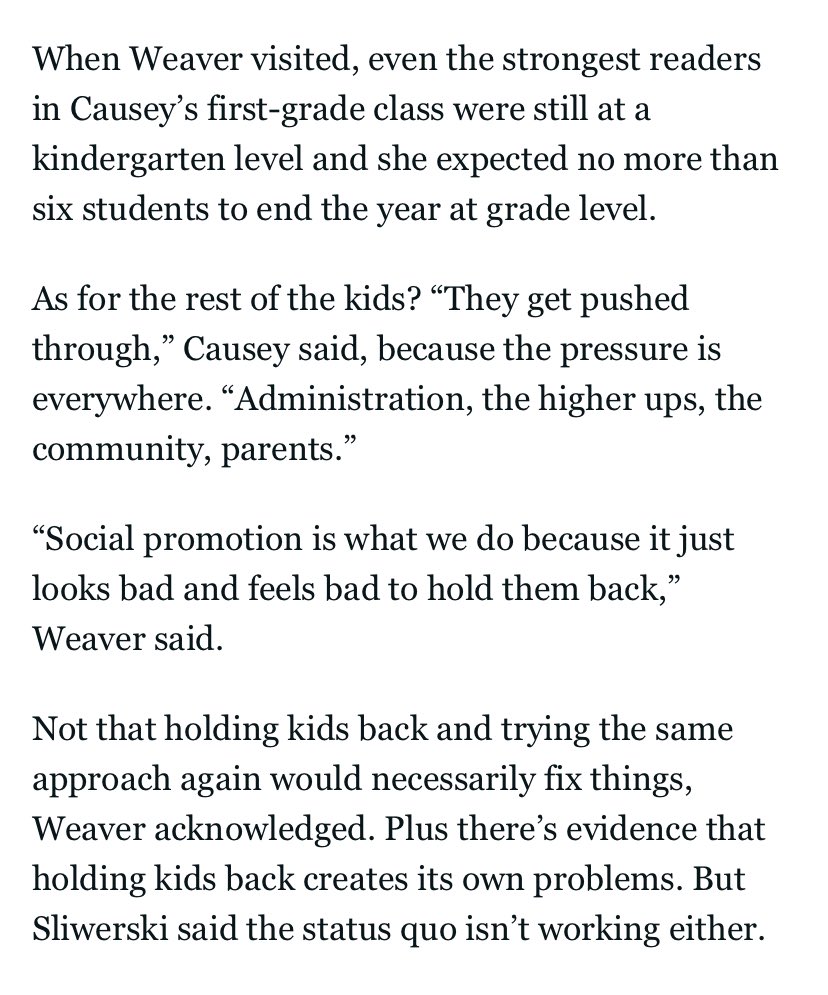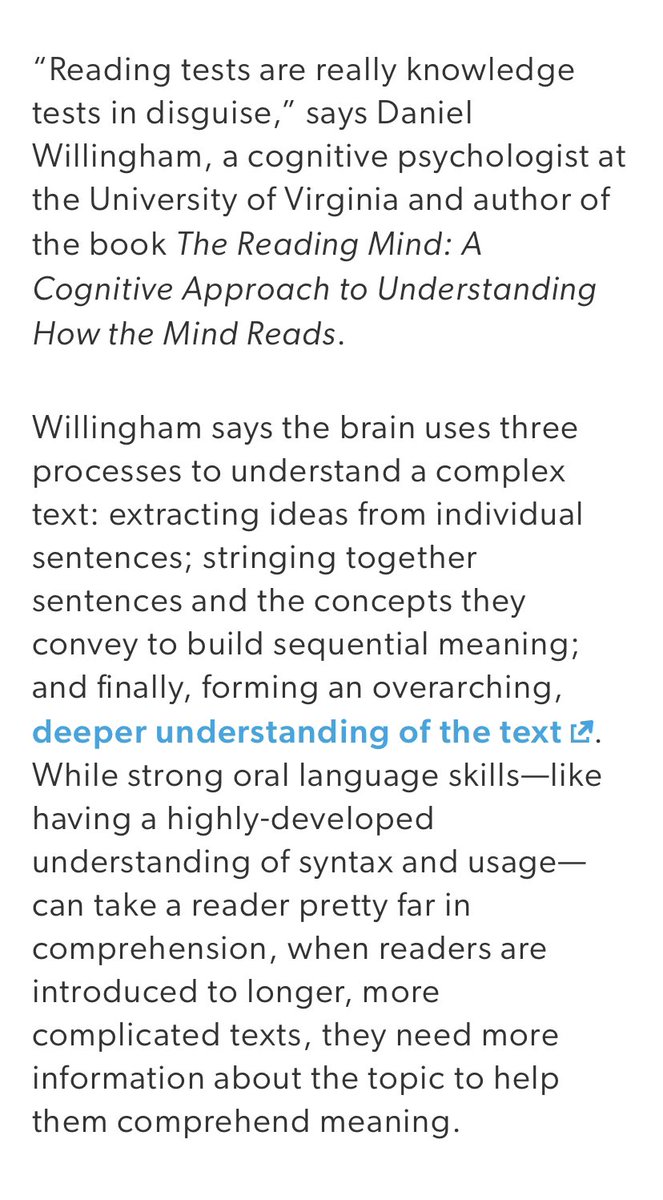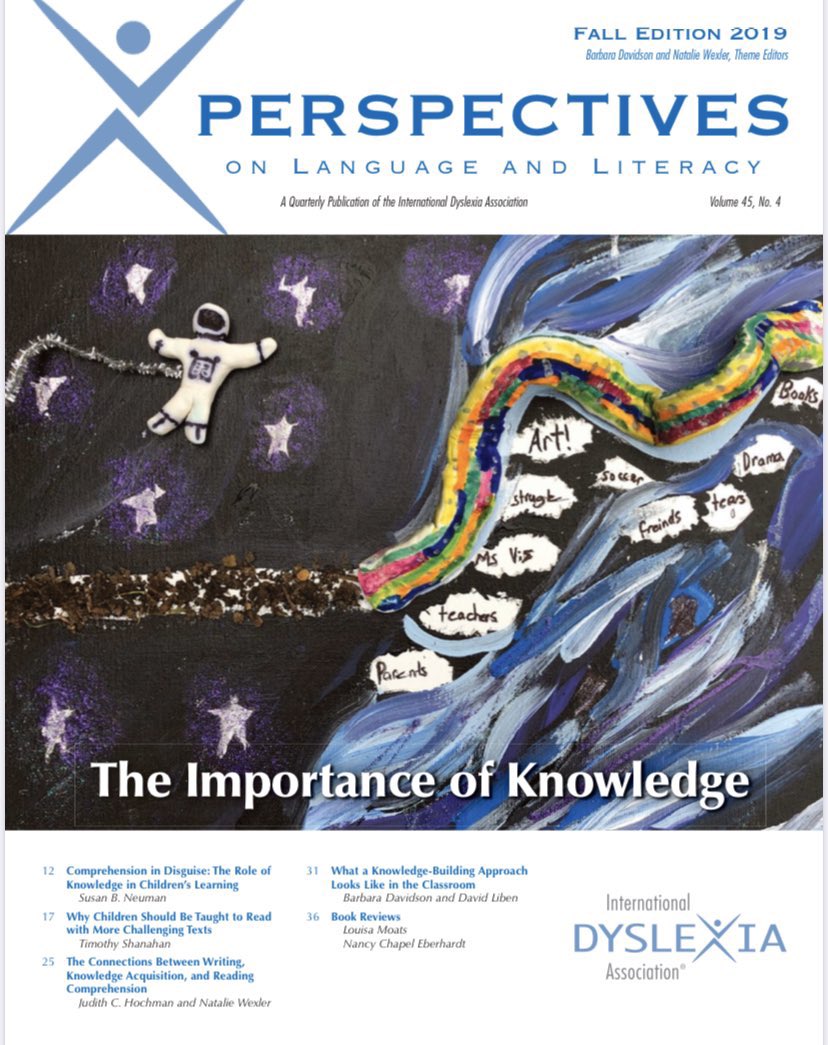Literacy can get lost in the K–12 conversation – especially in a year like this.
Sharing a few 2020 must-reads that you may have missed.
First, @leeromney’s superb reporting on ways that schools fail Black students with reading issues like dyslexia.
1/ https://www.kalw.org/post/public-schools-are-failing-black-students-dyslexia-one-grandmother-s-story
Sharing a few 2020 must-reads that you may have missed.
First, @leeromney’s superb reporting on ways that schools fail Black students with reading issues like dyslexia.
1/ https://www.kalw.org/post/public-schools-are-failing-black-students-dyslexia-one-grandmother-s-story
It spotlights a crucial issue: misguided assessments of struggling Black readers:
‘Evaluations of Robinson’s grandkids never mentioned dyslexia. Instead, they assigned the kids to a different special ed category.
“Intellectually disabled,” Robinson said, drawing out the words.’
‘Evaluations of Robinson’s grandkids never mentioned dyslexia. Instead, they assigned the kids to a different special ed category.
“Intellectually disabled,” Robinson said, drawing out the words.’
This major issue rarely gets a spotlight.
@leeromney’s two-part series deserves a read in full!
Part 1 unpacks issues with how we serve dyslexic Ss. Did you know @GavinNewsom is dyslexic?
Feat. @mgpotente @DDCalifornia. https://www.kalw.org/post/ca-school-districts-lag-dyslexia-hurting-low-income-kids-color-most
@leeromney’s two-part series deserves a read in full!
Part 1 unpacks issues with how we serve dyslexic Ss. Did you know @GavinNewsom is dyslexic?
Feat. @mgpotente @DDCalifornia. https://www.kalw.org/post/ca-school-districts-lag-dyslexia-hurting-low-income-kids-color-most
Another must-read: @vanessarancano’s piece parent advocacy for better reading instruction in Oakland, CA.
The emergence of advocacy groups like @TheOaklandREACH is an important development in K–12, and this is an excellent feature. https://www.kqed.org/mindshift/56629/how-families-are-pushing-schools-to-teach-reading-skills-more-effectively
The emergence of advocacy groups like @TheOaklandREACH is an important development in K–12, and this is an excellent feature. https://www.kqed.org/mindshift/56629/how-families-are-pushing-schools-to-teach-reading-skills-more-effectively
A segment we all need to reread 3x:
“When @KJWinEducation visited, even the strongest readers in Causey’s first-grade class were still at a K level and she expected no more than six students to end the year at grade level...”
They’re talking about the school’s work with #tcrwp.
“When @KJWinEducation visited, even the strongest readers in Causey’s first-grade class were still at a K level and she expected no more than six students to end the year at grade level...”
They’re talking about the school’s work with #tcrwp.
Next up, @HKorbey’s excellent explanation of the best alternative approach:
Curriculum that supports knowledge acquisition by students, in order to promote reading comprehension.
The same curricula make a break from drilling reading skills/strategies. https://www.edutopia.org/article/it-time-drop-finding-main-idea-and-teach-reading-new-way
Curriculum that supports knowledge acquisition by students, in order to promote reading comprehension.
The same curricula make a break from drilling reading skills/strategies. https://www.edutopia.org/article/it-time-drop-finding-main-idea-and-teach-reading-new-way
We get a spotlight on the widely-touted literacy work in @BaltCitySchools, as well as an examination of its cognitive science underpinnings, via discussion with @DTWillingham.
Cc: @SonjaSantelises @janiselane22 @kyairb @kstoryscotti @AshleyPCook24 @jennwenn79.
Cc: @SonjaSantelises @janiselane22 @kyairb @kstoryscotti @AshleyPCook24 @jennwenn79.
. @annschimke deserves an award for her consistent illumination of literacy issues!
I hope you read everything she wrote this year, and in particular:
A) this primer on curriculum shortcomings, with a focus on foundational skills https://co.chalkbeat.org/2020/3/27/21231320/why-do-so-many-colorado-students-struggle-to-read-flawed-curriculum-is-part-of-the-problem
I hope you read everything she wrote this year, and in particular:
A) this primer on curriculum shortcomings, with a focus on foundational skills https://co.chalkbeat.org/2020/3/27/21231320/why-do-so-many-colorado-students-struggle-to-read-flawed-curriculum-is-part-of-the-problem
B) This deeper dive by @annschimke into ELL supports in curriculum, which returns to the conversation about the importance of content knowledge. https://co.chalkbeat.org/2020/12/14/22164235/denver-benchmark-reading-curriculum-english-learners
Here’s a thread unpacking some of the layers of @annschimke’s recent piece, from quirks in CO’s reviews to questions about site-based decision-making on something this consequential. https://twitter.com/karenvaites/status/1340281464408186883
C) This piece on efforts by Colorado dyslexia advocates to inform parents about the essentials of curriculum selection.
TY @annschimke for all of this and more! https://co.chalkbeat.org/2020/10/26/21534976/colorado-parents-heres-what-to-ask-your-childs-school-about-reading-instruction
TY @annschimke for all of this and more! https://co.chalkbeat.org/2020/10/26/21534976/colorado-parents-heres-what-to-ask-your-childs-school-about-reading-instruction
Last but never least in reporting on reading instruction, we had @ehanford’s 4th audio-documentary.
It’s her broadest look yet, with a fine point on the issues for Black and brown students.
Listen to the audio version to hear @VesiaHawkins’s insights.
https://www.apmreports.org/episode/2020/08/06/what-the-words-say
It’s her broadest look yet, with a fine point on the issues for Black and brown students.
Listen to the audio version to hear @VesiaHawkins’s insights.
https://www.apmreports.org/episode/2020/08/06/what-the-words-say
Of course, @ehanford also broke the story that many will see as the literacy story of 2020:
The pivot by Lucy Calkins, developer of the influential Reading Workshop program, regarding the importance of decoding in word recognition: https://www.apmreports.org/story/2020/10/16/influential-literacy-expert-lucy-calkins-is-changing-her-views
The pivot by Lucy Calkins, developer of the influential Reading Workshop program, regarding the importance of decoding in word recognition: https://www.apmreports.org/story/2020/10/16/influential-literacy-expert-lucy-calkins-is-changing-her-views
Definitely read this piece by @s_e_schwartz (another regular hero of literacy coverage) to understand the Calkins pivot in more detail. https://www.edweek.org/teaching-learning/lucy-calkins-says-balanced-literacy-needs-rebalancing/2020/10
Calkins’s pivot has actually come in smaller increments (more on the early-2020 developments here). Yet it’s still a big deal.
Still unknown today:
1. When will #tcrwp materials update?
2. Will we get similar movement on content knowledge/text complexity? https://eduvaites.org/2020/01/25/understanding-the-concerns-about-teachers-college-reading-workshop/
Still unknown today:
1. When will #tcrwp materials update?
2. Will we get similar movement on content knowledge/text complexity? https://eduvaites.org/2020/01/25/understanding-the-concerns-about-teachers-college-reading-workshop/
In fact, I could argue that this sobering piece by @s_e_schwartz is actually the essential piece on the Calkins pivot.
It notes that “cueing” practices are EVERYWHERE, incl popular curricula like F&P, and it will take a lot to flush practice from K-12. https://www.edweek.org/teaching-learning/is-this-the-end-of-three-cueing/2020/12
It notes that “cueing” practices are EVERYWHERE, incl popular curricula like F&P, and it will take a lot to flush practice from K-12. https://www.edweek.org/teaching-learning/is-this-the-end-of-three-cueing/2020/12
In closing – a few pieces on literacy in COVID era.
First, an essential read by @SarahDSparks on a recent measure of learning loss in early grades – a major area of concern right now.
Presented in a thread because it connected so well to other pieces breaking at same time. https://twitter.com/karenvaites/status/1339927701931646980
First, an essential read by @SarahDSparks on a recent measure of learning loss in early grades – a major area of concern right now.
Presented in a thread because it connected so well to other pieces breaking at same time. https://twitter.com/karenvaites/status/1339927701931646980
& shout out to @PerryStein for strong literacy focus in her DC coverage.
Notable piece:
In March, 90% of 1st graders on benchmark.
“This fall... all 45 second-graders fell behind. Not a single student started the academic year reading on grade level.” https://www.washingtonpost.com/local/education/learning-to-read-on-zoom/2020/12/01/50718514-2b78-11eb-9b14-ad872157ebc9_story.html
Notable piece:
In March, 90% of 1st graders on benchmark.
“This fall... all 45 second-graders fell behind. Not a single student started the academic year reading on grade level.” https://www.washingtonpost.com/local/education/learning-to-read-on-zoom/2020/12/01/50718514-2b78-11eb-9b14-ad872157ebc9_story.html
The final read isn’t journalism.
It’s @robin_mcclellan of @SullCoSchools showing what’s possible when a district gets all of the above right.
The only district to announce some student gains in the COVID era (with a notable soft spot in 1st): https://tnscore.org/high-quality-instructional-materials-helped-minimize-pandemics-impact-on-literacy-outcomes/
It’s @robin_mcclellan of @SullCoSchools showing what’s possible when a district gets all of the above right.
The only district to announce some student gains in the COVID era (with a notable soft spot in 1st): https://tnscore.org/high-quality-instructional-materials-helped-minimize-pandemics-impact-on-literacy-outcomes/
. @robin_mcclellan’s outcomes explain why we need to focus on all of the above: evidence-based instructional practice, enabled for ALL students by common curriculum that covers all these bases (foundational skills, content knowledge, more).
A few reflections on the coverage I hope we see in 2021:
1. We heard a LOT about Teachers College Reading Workshop in the reads above. Will F&P and similar get equal scrutiny soon?
Fountas and Pinnell has been making interesting moves (w/o changing their product). https://twitter.com/karsextavis/status/1331538452408651778
https://twitter.com/karsextavis/status/1331538452408651778
1. We heard a LOT about Teachers College Reading Workshop in the reads above. Will F&P and similar get equal scrutiny soon?
Fountas and Pinnell has been making interesting moves (w/o changing their product).
 https://twitter.com/karsextavis/status/1331538452408651778
https://twitter.com/karsextavis/status/1331538452408651778
2. Leveled reading groups!!!!!
They remain The Great Undiscussed Issue in our national reading conversation... AND one that is naturally interesting to parents and teachers!
Here is an earlier thread with background reading and sources galore. https://twitter.com/karenvaites/status/1277623756756783104
They remain The Great Undiscussed Issue in our national reading conversation... AND one that is naturally interesting to parents and teachers!
Here is an earlier thread with background reading and sources galore. https://twitter.com/karenvaites/status/1277623756756783104
TY to all journalists above for keeping literacy at the fore. 
I didn’t even get to the bloggers & columnists, tho @natwexler @right2readproj @MsJasmineMN @mandercorn @MrGmpls @ReadOrPrison all wrote wonderful pieces that deserve their own thread. Maybe I’ll write it next.

I didn’t even get to the bloggers & columnists, tho @natwexler @right2readproj @MsJasmineMN @mandercorn @MrGmpls @ReadOrPrison all wrote wonderful pieces that deserve their own thread. Maybe I’ll write it next.

Now, what did I miss? (BC I’m sure I missed a few must-reads!) @ShannonSaglio1 @tiffany_peltier @MsKurto @LindsayKemeny @ELindstromPhD @Estep_S @DrMariaMurray1 @MiriamFein @TheAaveMaria @drheidibc @janhasbrouck @weedentracy @enJOYliteracy @bethhill2829 @BethACGonzalez @ystewart1
TY @ShannonSaglio1 for adding a great article from @AFTunion magazine, reminding me that they produced an excellent issue on reading this year, incl @natwexler @ReadingShanahan @DrMariaMurray1 @LouisaMoats and more: https://twitter.com/karenvaites/status/1270698923057917952
More good reading:
The @DyslexiaIDA journal devoted an entire issue to the importance of background knowledge to comprehension, edited by @natwexler @bdavidsonKMC.
It became openly available in early 2020:
https://cdn.coverstand.com/13959/644729/f035fee3722e70841e135f650d679ce8e6857aba.pdf
The @DyslexiaIDA journal devoted an entire issue to the importance of background knowledge to comprehension, edited by @natwexler @bdavidsonKMC.
It became openly available in early 2020:
https://cdn.coverstand.com/13959/644729/f035fee3722e70841e135f650d679ce8e6857aba.pdf
One more for the 2020 literacy reads list, on specific challenges in pandemic learning.
By @lesliebrody: https://twitter.com/karenvaites/status/1343622483350593537
By @lesliebrody: https://twitter.com/karenvaites/status/1343622483350593537
I almost forgot this superb piece on two families with dyslexic children by @MichaelElsenRoo, published back in February (which feels like another decade!).
A must-read!
Featuring @ReadOrPrison’s story. https://www.usatoday.com/in-depth/news/education/2020/02/09/disability-special-education-dyslexia-doe-nyc-sped-private-placement/4651419002/
A must-read!
Featuring @ReadOrPrison’s story. https://www.usatoday.com/in-depth/news/education/2020/02/09/disability-special-education-dyslexia-doe-nyc-sped-private-placement/4651419002/
Another day, another superb article with major literacy implications...
@julianahyekim on impacts of remote learning on ELL students. https://www.nytimes.com/2020/12/29/nyregion/coronavirus-english-language-students.html
@julianahyekim on impacts of remote learning on ELL students. https://www.nytimes.com/2020/12/29/nyregion/coronavirus-english-language-students.html

 Read on Twitter
Read on Twitter




